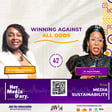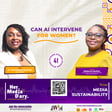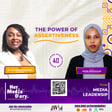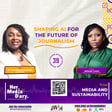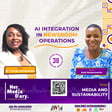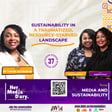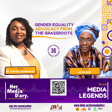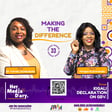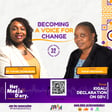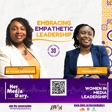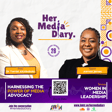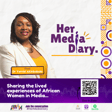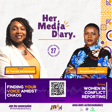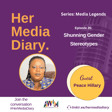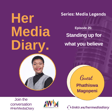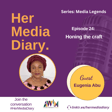Become a Creator today!Start creating today - Share your story with the world!
Start for free
00:00:00
00:00:01

Fact-checking and Verification
In our third episode of our four-part podcast series, Covid-19 for Journalists, Dr Yemisi Akinbobola is joined by Jane Godia, Capacity Building Manager, Africa, for WAN-IFRA's Women in News; Motunrayo Joel, Africa Checks' Nigeria deputy editor, and Paul Bradshaw, BBC data journalist and Associate Professor at Birmingham City University.
We talk about the differences between fact-checking and verification, how newsrooms are fact-checking world leaders like Donald Trump, and the need for media literacy alongside technological responses to misinformation.
Transcript
Introduction and Importance of Fact-Checking
00:00:02
Speaker
Hello everyone and welcome to our third episode of the COVID-19 for journalists podcast. My name is Dr. Yem-Siya Kimpopola. I'm co-founder of Ask a Woman in Media. Today we are talking about fact checking and verification, particularly important as we tackle the epidemic around the COVID-19 pandemic, but also more broadly in terms of tackling fake news, misinformation and disinformation. And I'm joined by experts in the field who are going to help us unpack
00:00:31
Speaker
the emerging challenges and also to look at how newsrooms and journalists are tackling this. So welcome. Would you start by introducing yourself? My name is Jane Godia. I work for the Wild Association of News Publishers and the Women in News Program.
00:00:50
Speaker
This is a media development arm of the program and I work as the capacity building manager for Africa. Women in News is actually a leadership accelerator where we build women's skills in terms of getting them into leadership and management positions, as well as giving them other skills to enable their survival in the newsroom.
00:01:19
Speaker
I previously worked as the program manager for East and Central Africa and before that I was the coach for Africa. Previously, I worked in the newsroom and I worked at the standard media group. Yeah, that's what I've been up, just been in media like for that long. And could you tell us one interesting fact about yourself?
00:01:41
Speaker
But now what's interesting about me, I love music, I love reading, I love watching movies, and I just love life. That's the most, the most interesting thing about me, just love life. Yeah, I can attest to the fact that Jane loves life, so that's good to hear. And then Moturayo, how about you?
Roles and Missions in Fact-Checking
00:02:02
Speaker
Introduction. All right, so my name is Moturayo Juel. I'm the Nigeria Deputy Editor and Health Researcher at Africa Check.
00:02:11
Speaker
Africa Check is a fact-checking organization. We're independent. We're a non-profit organization. Our headquarters is in South Africa. However, we have offices in Lagos, where I am, in Senegal and in Kenya. So what we do is to fact-check fake news, fact-check information, fact-check claims also made by public figures. And we don't just ensure that these claims are fact-checked. We go ahead to reach out to whoever made the claim.
00:02:41
Speaker
especially if the claim is not correct so we go ahead to reach out to them to ensure that they put up correct information so we were founded in London in 2012 and at the moment we are about 30 something I'm not too sure about 30 something persons in our team that's a combination of South Africa, Kenya
00:03:01
Speaker
and Senegal and Nigeria. So we're a small team in Nigeria. We're just about four of us. But we love what we do, despite the fact that there's so much workload for us, especially in the Nigeria space where you come across fake news on an hourly basis, on a daily basis. So that's pretty much what Africa Check is about.
00:03:25
Speaker
Then an interesting fact about me as, so the first part of my life, when I started working for the first 10 years of my life, I didn't enjoy what I was doing, but I can gladly say and to the glory of God that I'm actually enjoying what I'm doing. So that's what I can say about myself. Yeah.
Fact-Checking vs Verification in Journalism
00:03:47
Speaker
Hi, yes, my name is Paul Bradshaw. I run the master's programs in journalism at Birmingham City University. That includes data journalism and multi-platform journalism. I also work as a data journalist with the BBC in their data units in Birmingham, and I write a blog and a number of books on online journalism and data journalism. I'm going to start with a very broad question. What is
00:04:17
Speaker
fact, checking and verification. What's the difference between the two and why is it important? So we start with more trial.
00:04:24
Speaker
Okay, so in my view, fact checking is practically checking facts, ensuring that whatever statement you make, be it on social media, in newspaper, on TV, is the fact. Fact checking is about using everything possible, be it your gadget, your laptop, even reaching out to experts, reaching out to global agencies to ensure that whatever statement, whatever claim you want to make,
00:04:53
Speaker
it's the truth is the fact and it's not fiction so verification for me in my own view is just it's pretty much this almost the same as fact checking but is there's a thin line between both of them. So how would you define fact checking? I think the two are slightly different but also that there's an overlap between the two so verification is is often about establishing
00:05:21
Speaker
particular details about a piece of information. So does it come from the person that it's purported to be from? Is it about the place and the time that it's supposed to be? And then that moves into fact checking, you know, are the actual facts true? Are they accurate and accurate representation? And there can be lots of different types of information that this applies to. So there can be different forms of verification and different types of fact checking.
00:05:49
Speaker
It's obviously very important because now is a good example of when lies are spread, that can be very damaging. It can be damaging to people's health. That's happening right now with people believing misinformation.
Challenges of Misinformation and Deadlines
00:06:03
Speaker
It can be damaging commercially, obviously, and it can be damaging personally. And for us as journalists, it can be damaging to our brands where a lot of our
00:06:13
Speaker
reputation is based on our ability to tell the truth and identify the truth and to hold Parata account when it does not tell the truth or it misrepresents things. Do you agree with that definition of why is it the people problem? Yes, I think fact checking is all about getting it right just to ensure that it is right and verification is just about establishing the truth and accuracy and validating
00:06:41
Speaker
So improve the various mechanisms of trying to arrive at the truth so that we can create informed reporting for citizens, right? So as for newsrooms and in your industries, in your professions, what challenges has this era of talking posed for journalists? What are the things that you're experiencing? Particularly, for example, in your role at Africa Check, how are you supporting journalists and what are the kind of challenges
00:07:07
Speaker
Speaking for journalists, I remember when we started training journalists and most of the challenges they were facing was the issue of deadline, the issue of not having access to websites, to experts that can be able to fact check or probably confirm a claim. So I think for journalists, the challenges they're facing, especially
00:07:31
Speaker
in this era of fake news is meeting up with deadline and also trying to break the news. But as a newspaper house, as a journalist, as a media organization, it's really important that they fact check whatever they want to put on their website. On a number of times, we have fact checked a good number of newspaper houses who put up something on their website just in a bid to break the news and to meet up with deadline and shooting themselves in the foot, you know.
00:08:00
Speaker
So I think those are the challenges journalists are facing and with fake news. Yeah that's an interesting point to make in terms of that fight to be the first to break news and the impact it has on the quality of stories being reported. How about from your end
00:08:17
Speaker
The challenges are really coming from every angle. We've got, from the top, you have politicians, very senior politicians, sometimes being misleading, sometimes spreading outright misinformation. And Donald Trump is probably the best known example of that and some of the claims that he's made about certain medical treatments, for example, about the level of the threat of the coronavirus in Brazil. We've seen a similar pattern.
00:08:46
Speaker
But there are more subtle forms as well from the top. So in the UK, we've seen charts being used, not really comparing the same figures across different countries, the same sorts of information. And then, you know, from the bottom, we've got all sorts of hoaxes, so things like 5G being the cause of it. We've got rumours about who's responsible for it, whether it was manufactured in a lab, that sort of thing. We've got opportunists who are trying to make money out of
00:09:16
Speaker
what they are pretending accures. We've got political opportunism as well. So there's a whole wide range of different types of information that we might need to check. Even some of it might be satirical, you know, comedy stuff that then is believed and these spreaders misinformation and people doing it just for the laughs if you like. So it comes from every direction.
00:09:42
Speaker
and Jane as somebody who does capacity building for newsrooms and remaining news in particular. What are the challenges that you're having to kind of address for journalists with the type of fake news and misinformation?
00:09:58
Speaker
I think the rush to beat deadlines, the rush to be the first to the goalpost. It's like newsrooms are competing in terms of who will be the first. And this rush, in addition to the upside of internet and social media, you find that people are sharing, and now there are so many groups like in Facebook or in WhatsApp, and people are sharing information
00:10:23
Speaker
without verifying whether this information is true, but sadly is that this shared information finds its way into
Impact of Technology and Social Media
00:10:32
Speaker
newsrooms. Like you can find something was shared on WhatsApp, a video, and sadly you are watching news, you are seeing it there. And they've not even verified whether that information is true or false. And by the time the truth catches up with everybody, the damage has already been done.
00:10:51
Speaker
So technology has played a role because now you find that people are not doing their research. Previously, we had libraries in our newsrooms where we would go to and we would look for information. But now everybody is rushing to the internet. And you find that in the internet, there are so many websites that are capitalizing on that fake information, which then journalists are picking and using.
00:11:19
Speaker
Just that, that's actually the biggest challenge. I think it's the technology and the world now being a global space within because of technological advancement. You know, somebody, they are picking logos, they are picking signatures, then the people who are doing the fake things, when they pick a logo and they pick a signature.
00:11:41
Speaker
you pick whatever is in that information as true, because when you see a logo and you see a signature, you simply assume that that is the truth, while many times it is not. Yeah, that's a very big challenge. And that's really interesting, the fact that people can create these content and actually use official logos to make it seem more true than it is. Moturayo, how are you supporting newsrooms in tackling the emerging fake news and misinformation around COVID-19?
00:12:12
Speaker
Sometime last year or two years ago, we created a WhatsApp group and included a good number of health journalists. So what we do is that anytime our report gets published, we go on our WhatsApp group and we share this information, which also helps the journalists on the platform in case they come across it. And we also get engaged with them, tell them to share with us information or fake news that they have seen online.
00:12:39
Speaker
Over time, we've built a sort of partnership with journalists. We see it as us helping them and them also helping us. We put our fact checks on the WhatsApp group and on other platforms. We plan to train journalists and we have taken open ourselves to ensure that
00:12:55
Speaker
In a year, we train a good number, a huge number of journalists. And we've realised that ever since we started training journalists on how to spot fake news, on how to fact check and rest, their reports have really improved. So that's what I can say about that. So you mentioned earlier on about fact checking public figures when they say things that perhaps are not quite true. What are the challenges for you there in terms
Public Figures and Confirmation Challenges
00:13:20
Speaker
of your work? Do you know certain of the challenges around fact checking public figures?
00:13:26
Speaker
oh yeah so the challenge we face is is reaching out to them to confirm if they said what they what what was published it's a norm at africa check that before we write any report we go ahead to call or to send an email or to send a message to whoever made the claim and uniquely some of these public figures immediately they see that you're trying to partake them they think that you think they're lying so they probably just
00:13:50
Speaker
they just block you off or don't even reply you which sort of hinders our report so that's one area we're facing and another area is getting them to admit that they were wrong and put up the correct information most times they don't respond to our request to for them to put up the current information so those are the two major challenges we're facing okay so my next question now is media organizations are we are responding to
00:14:18
Speaker
this era of fake news and misinformation in a variety of ways.
Newsroom Adaptations for Accuracy
00:14:22
Speaker
So what are some of the best practices of newsrooms who are doing a good job in tackling fake news and misinformation they can tell us about? Jane, do you want to take that question?
00:14:34
Speaker
What I've seen, I still do a lot of work with editors and there are organizations that have employed editors whose work is basically to verify that truth and before that information goes out there. So I think newsrooms that have fallen prey to fake news have started doing things.
00:14:56
Speaker
that are helping them do due diligence in the information they receive before they can share it out with the public. And that is very, very important. Moturaya, Africa Check, the very way in which you guys work, is an example of best practices, right? So for the newsrooms that you work with, that you support, are there any particular best examples they can point to to illustrate ways in which other newsrooms might learn from their practices?
00:15:27
Speaker
Yes, so I actually share Jane's view on how newsrooms are beginning to verify news and what we've noticed at our end is that a number of media organizations, I can mention The Punch, I can mention Guardian, so a number of media organizations are beginning to have a fact-checking arm so in the sense that before they publish any information they reach out to the fact-checking desk
00:15:52
Speaker
to ensure that the information they want to put out is the truth and it has been verified. So I think that is a good move coming from media organizations. A number of them are beginning to have the fact-checking deaths. So despite the fact that they have to deal with deadlines and the rest, they ensure that news or information gotten from WhatsApp and whoever passes through the fact-checking deaths before it gets published on their website. And Paul, how about you? What kind of emerging
00:16:19
Speaker
best practices that you're coming across in museums around the world? I think what's been really interesting to follow in the US is
00:16:28
Speaker
the debate around to what extent to allow Trump to broadcast live on TV networks, for example. One of the extra challenges that we have journalistically isn't just that people in power are lying or misleading, which has always happened, but the big challenge is that they have a direct channel to
00:16:50
Speaker
So, you know, even previously when politicians misled, they were aware that they were reliant on the media to get their message to an audience and that media would put any lies into context. With Donald Trump's briefings, he's broadcasting live to the nation and without necessarily any intermedia or any context.
00:17:15
Speaker
So, some news organisations have taken different approaches to that. Some of them have suggested putting a time lag in, so it might be a 30-second delay, which will allow them to check the statements that are being made and then to add that context as he is saying it on air, so to put his statements into factual context as they're being made. Sort of live, so with a slight delay.
00:17:39
Speaker
Another decision that a number of broadcasters have made is to only broadcast the initial part of the briefing and then to cut away and to then start to put it into context and again start to establish some of the factual basis or not the statements that are being made and of course some choose not to not to cover it. What's really really tricky in this situation is that when you see a country going to a national emergency like this
00:18:07
Speaker
The normal tendency of the media is to, to some extent, join the state in a joint effort.
Journalistic Challenges with Political Misleading
00:18:14
Speaker
So in wars, for example, news organizations become more propagandistic, they're more about mobilizing the national effort. But this is a very different situation where we've not got an enemy, it's not like
00:18:29
Speaker
the coronavirus is going to behave in a different way because of what's being broadcast. So you get people expecting journalists to kind of side with the government when they don't actually need to. And it's been very interesting to see the shift in journalistic behaviour towards that holding
00:18:51
Speaker
to account. There are a number of techniques and it's still early days. I think Trump has, even before the pandemic, Trump really posed a massive challenge for journalists in how you cover a politician who cares so little about necessarily being truthful and
00:19:12
Speaker
I still don't think they've come up with a solution to that. The big reason for that is that we still don't know how to deal with an information environment where people can just choose the information that confirms their own opinions and prejudices, if you like. So that's a problem we still haven't come to solve, although I think we're closer to it than we have been 10 years ago. All right then, so this moves us nicely to my final question. What gaps
00:19:42
Speaker
and then with initiatives that you're seeing. So we'll talk about best practices, we'll talk about the fact that they're new roles, fact-checking roles in newsrooms. What are the kind of gaps that you think you'd like to see filled in some of these initiatives?
00:19:58
Speaker
For me, I think because we have come to a point where we realize that fake news is a challenge and we have to deal with the misinformation, we need to start nipping it on the bad from schools. Can colleges, for example, have a curriculum on identifying fake news so that those who are students of journalism
00:20:25
Speaker
can immediately start to know that they are going to go out in the field and they are going to come across information that is not true and they are going to come across a lot of information and that when they come across this information they need to do
00:20:42
Speaker
verification they need to fact check and ensure that in any story whether they are writers or whether they are editors that they have to ensure that the stories that are passing through their hands is true because it is all about your reputation and the reputation of the organization where you are working.
00:21:04
Speaker
And if you don't do the right thing, then nobody will come to you. You will not be the sort of journalist. So for me, I think we need to have a curriculum to help journalists to identify fake news. And beyond college, then maybe we need to have short courses. Can we then decide that we can have short courses?
00:21:25
Speaker
on how to identify fake news and how to deal with fake news. I think that is what is going to help us. That's a huge gap because people don't have the knowledge on how to identify fake news and I like what Montario said that they've been working with journalists and they have helped them
00:21:44
Speaker
to have the ability and the knowledge to identify fake news. So if this can be cascaded across the region, then it would really help us in terms of how we can deal with fake news. And also, if newsrooms and journalists can just develop, create a directory of websites,
00:22:06
Speaker
because people know that this one is fake. This is a website that gives fake information. So can we then just have a directory of these websites and just have them and share them amongst ourselves so that when we come across this, then we are able to identify that the information we are getting is not right. That's what I have to say.
00:22:32
Speaker
It's really filling the gap because the knowledge is not there and giving people the knowledge to be able to identify fake information. Yeah, thank you. Thank you Jane. And that's a really interesting point in terms of capacity building of journalists to themselves be able to identify fake news so that they're not part of that cycle of distribution of such content. And Moturaya, how about you? What are some of the gaps that you'd like to see filled
00:22:59
Speaker
in terms of these initiatives, what's not being done that you'd like to see more of.
00:23:04
Speaker
I'm totally in support of what Jane said about going to schools, going to secondary schools, I believe, and going to universities to teach them how to fact check, how to spot fake news, how to verify information. I think that would go a long way. Before we experienced the lockdown in Nigeria, our plan was to go to secondary schools and to teach them how to
Educational Reforms and Technological Interventions
00:23:29
Speaker
fact check how to spot fake news and the rest so that was kind of like hinted because of the lockdown I think it would go a long way if we can train children train this young kids right from a young age about about fact checking so by the time they reach our get our age they would have been already enlightened about the impact and the consequences and the effect of sharing fake news
00:23:59
Speaker
Some of the best approaches, I think, are the ones that take the battle to the territory, if you like. So those sorts of conspiracy theories tend to be especially widely shared on chat apps, messaging apps, on platforms where it's not very easy to see that people are sharing them. When they're shared on a public platform like Twitter or Facebook, it's easier to
00:24:28
Speaker
to spot, but there have been some really interesting initiatives where news organisations have set up WhatsApp groups and news stores, also using the language of viral content, so being very visual, there was a Spanish initiative, fact-checking initiative, where they
00:24:50
Speaker
were using, you know, creating these memes, essentially, that were fact checking and debunking misinformation. And I think that's a really useful technique. I think spreading visual things rather than just being, you know, this is not true. Using the language that resonates with people, the sort of visual language, I think is particularly effective. To some extent, I think
00:25:18
Speaker
It's not just a problem for journalists. The biggest challenge here is that partly there's a cultural challenge. And you're seeing that happening in schools now, the way that children are being educated in this sort of how to spot misinformation. So I think that will help.
00:25:39
Speaker
I think there's a technical challenge here and we are slowly seeing Facebook and Twitter and other platforms start to take responsibility for that. And the coronavirus, perhaps one of its biggest impacts will be in that respect in terms of journalism and fact checking because
00:25:58
Speaker
We are seeing social platforms, and YouTube for that matter, taking a much more proactive role, a public health role, in trying to reduce people's susceptibility to misinformation. So even, you know, if you're searching for these things on Google, you'll get, if you like, warnings or, you know, if you're searching for things on Facebook, you'll be directed to particular pages.
00:26:20
Speaker
And that's probably one area where the biggest role can be played. There's also evidence that when we respond more slowly, we're less likely to be fooled. So it's where you instinctively, you know, your knee-jerk reaction is to retweet something, and then you realise it's fake too late. If you slow down in that process, I think there's something that can be done technically to slow people down. In fact, I saw a really interesting, there's a children's app,
00:26:51
Speaker
like a chat app where they essentially nudge the child. If they say something negative, they're kind of asked, are you sure you want to say that? And that sort of all sorts of techniques I think are really interesting where an artificial intelligence can have a big role in this where if it's able to detect that you are responding too quickly or you're responding in a certain emotional way, that there is some sort of check that says, you know, are you sure you want to share this?
00:27:19
Speaker
So I think there's a role there. I think artificial intelligence generally, at the beginning of an arms race, in terms of artificial intelligence being used to create fake content, but also artificial intelligence being used to detect misinformation and fake content.
00:27:39
Speaker
so that I think will escalate and I could go on and on in terms of in terms of other methods and other issues. Ultimately there are so many different types of misinformation and the distinctions are so subtle in some respects so it's very difficult to tell the difference between something that is satire and something that is a genuine hoax for example but I think some types of misinformation and some behaviours I think is where we can
00:28:07
Speaker
we can
Stress Management During Lockdown
00:28:08
Speaker
improve. One area of where I do see things improving and where we do need to improve is actually understanding how people can be persuaded that something is false. That has been the big realisation for journalism in the last five years, maybe ten years, is that we've really woken up to the fact that simply reporting the truth is not
00:28:31
Speaker
effective it doesn't that's not enough on its own and as journalists we've kind of always had this faith that as long as we told the truth as long as we said that you know a prime minister is lying or a president is lying then people will realize that simply is not true we know that people will
00:28:48
Speaker
stubbornly hold on to things that they not only that is that has been demonstrated to be true but even when the President's own spokesperson admits that a statement was not true even then supporters will will cling on to their beliefs because they become a political expression of identity so
00:29:06
Speaker
We're now having to learn, OK, what ways of reporting are going to get that message across, are going to change perceptions and behaviour. And that's probably the biggest challenge for journalism in particular. I think there are other challenges for tech companies, but for journalism, it's how we tell that story that doesn't create a reaction where people just say, I don't believe you.
00:29:30
Speaker
Well thank you very much everybody for joining me this very early morning recording at 6am in Nigeria, 8am in Nairobi. So thank you so much for waking up to join me today. Before we go, what was the one thing, one tip you'd share with our audience in getting by during this period of lockdown and working from home? Yeah, I think one tip is that it's stressful and you can't sit on your table from
00:29:58
Speaker
eight to six, you know, just in the house. I think you can take a break. You can watch news. You can watch a movie. You can take a walk. I normally take a walk some time after sitting for long and you come back refreshed. So taking a walk will really help you. If you can walk outside, remember to wear your mask and remember to sanitize. Thank you, Jane.
00:30:26
Speaker
Yeah, for me taking a walk also helps, but I really don't like going out and taking walks. So I think just doing like five minutes exercise, either jumping on the same spot or maybe just doing some form of aerobics.
00:30:42
Speaker
Yeah, so I think that would help. And sleeping too, I've realised that ever since I started ensuring that I sleep for at least like an hour or two in the day, it gets me refreshed. Because walking from home, you would be so surprised that you can be on your laptop from 9am to 10pm, you know. So I think sleeping and doing aerobics is helping and is working for me. Fantastic. Yeah, I think I'm finding
00:31:10
Speaker
Though I can't sleep, I've got three young kids at home who are constantly requiring my attention. So, sleeping for me is kind of, you know, pushed back for now, but definitely exercising. I think for other working parents, as well as young kids, I think what I found is routine has really helped.
00:31:37
Speaker
you know, what time they're going to have a break, what time they're going to get back, so that's my one for you to get kicked on everything that saves you from your time here. Alright, thank you very much for joining me this morning.
